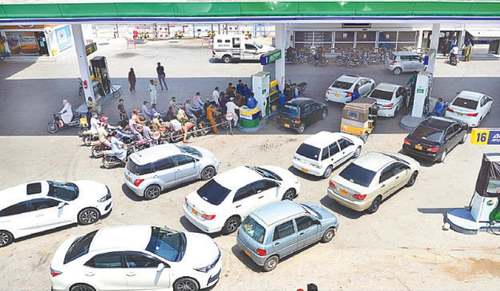ISLAMABAD: With sufficient oil-related revenue in the kitty, the government on Friday increased the prices of all petroleum products by three per cent to 6pc for the next 16 days.
According to an announcement by the finance ministry, the ex-depot prices of petrol and high speed diesel (HSD) were increased by Rs3.20 and Rs2.95 per litre, respectively. The prices of kerosene and light diesel oil (LDO) were jacked up by Rs3 and Rs4.42 per litre, respectively.
In doing so, the government slightly increased petroleum levy on petrol, kerosene, and LDO. The levy on HSD was kept unchanged and simply the impact of higher international price was passed on to consumers.
The ex-depot price of HSD was increased to Rs113.19 per litre from Rs110.24, showing an increase of Rs2.95 (2.67pc). HSD is mostly used in heavy transport vehicles, trains and agricultural engines like trucks, buses, tractors, tubewells and threshers. This is one of the key contributors to inflation.
The ex-depot price of petrol was raised to Rs109.20 per litre from Rs106, showing an increase of Rs3.20 (2.90pc). Petrol is mostly used in private transport, small vehicles, rickshaws and two-wheelers.
The ex-depot price of kerosene was increased by Rs3 per litre (4.07pc) to Rs76.65 from Rs73.65. Kerosene oil is mostly used by unscrupulous elements for mixing it with petrol and to some extent for lighting in very remote areas.
The ex-depot rate of LDO was increased by Rs4.42 (6.15pc) per litre to Rs76.23 from Rs71.81. LDO is consumed by flour mills and a couple of power plants.
In revising the prices of petroleum products, the government increased the levy on petrol by about 80 paisa per litre. An official said the government had collected about 33pc higher than targeted revenue on petroleum products through the levy in the first six months of the current fiscal year. Therefore, it was comfortable with minor adjustments in petroleum levy.
In this way, petroleum levy on both major products — petrol and HSD — came in at about Rs24 per litre.
The government is currently charging a standard rate of 17pc general sales tax (GST) across the board on all products to generate additional revenue while petroleum levy is slightly lower than maximum permissible limit.
Interestingly, based on 17pc GST and Rs30 per litre petroleum levy, the Oil and Gas Regulatory Authority had calculated an increase of Rs13 per litre on petrol, Rs11 on HSD and kerosene and Rs15 on LDO, according to a government official.
As such, the government is now charging a total of about Rs42 per litre tax on petrol and HSD. Over the last many months, the government has been increasing petroleum levy rates instead of GST as the levy remains in the federal kitty while GST goes to the divisible pool taxes and thus about 57pc share is grabbed by the provinces.
Petrol and HSD are two major products that generate most of the revenue for the government because of their massive and yet growing consumption in the country. Average petrol sales are touching 700,000 tonnes per month against the monthly HSD consumption of around 600,000 tonnes. Sales of kerosene and LDO are generally less than 11,000 and 2000 tonnes per month, respectively.
Under a new mechanism, oil prices are revised by the government on a fortnightly basis to pass on international prices published in Platt’s Oilgram instead of the previous mechanism of monthly calculations on the basis of import cost of the state-run Pakistan State Oil.
Published in Dawn, January 16th, 2021














































